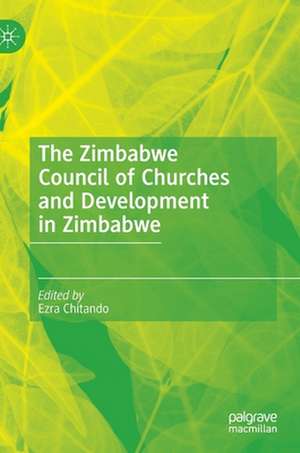The Zimbabwe Council of Churches and Development in Zimbabwe
Editat de Ezra Chitandoen Limba Engleză Hardback – 23 mai 2020
| Toate formatele și edițiile | Preț | Express |
|---|---|---|
| Paperback (1) | 635.65 lei 6-8 săpt. | |
| Springer International Publishing – 23 mai 2021 | 635.65 lei 6-8 săpt. | |
| Hardback (1) | 566.41 lei 3-5 săpt. | +19.34 lei 6-10 zile |
| Springer International Publishing – 23 mai 2020 | 566.41 lei 3-5 săpt. | +19.34 lei 6-10 zile |
Preț: 566.41 lei
Preț vechi: 708.02 lei
-20% Nou
Puncte Express: 850
Preț estimativ în valută:
108.38€ • 118.10$ • 91.33£
108.38€ • 118.10$ • 91.33£
Carte disponibilă
Livrare economică 02-16 aprilie
Livrare express 18-22 martie pentru 29.33 lei
Preluare comenzi: 021 569.72.76
Specificații
ISBN-13: 9783030416027
ISBN-10: 303041602X
Pagini: 210
Ilustrații: XI, 223 p.
Dimensiuni: 148 x 210 x 21 mm
Greutate: 0.43 kg
Ediția:1st ed. 2020
Editura: Springer International Publishing
Colecția Palgrave Macmillan
Locul publicării:Cham, Switzerland
ISBN-10: 303041602X
Pagini: 210
Ilustrații: XI, 223 p.
Dimensiuni: 148 x 210 x 21 mm
Greutate: 0.43 kg
Ediția:1st ed. 2020
Editura: Springer International Publishing
Colecția Palgrave Macmillan
Locul publicării:Cham, Switzerland
Cuprins
Introduction: The Zimbabwe Council of Churches and Development in Zimbabwe - Ezra Chitando.- Chapter 1 The Zimbabwe Council of Churches, Politics and Development from 1980 to 2015 - Munetsi Ruzivo.- Chapter 2 Together for Development? The Zimbabwe Council of Churches, Zimbabwe Catholic Bishops Conference and the Evangelical Fellowship of Zimbabwe - Molly Manyonganise.- Chapter 3 Quo vadis the Catholic Church and the Zimbabwe Council of Churches? Exploring the ‘mine is right’ dilemmas in the path to Christian unity in Zimbabwe - Canisius Mwandayi and Theresa Mugwidi.- Chapter 4 The Zimbabwe Council of Churches and ‘Crisis’ Ecumenical Groups - Joram Tarusarira.- Chapter 5 The Church, Praxis Theology and Development in Zimbabwe - Richard S. Maposa.- Chapter 6 Church-Politics nexus: An analysis of the Zimbabwe Council of Churches (ZCC) and political engagement - Ashton Murwira and Charity Manyeruke.- Chapter 7 The Zimbabwe Council of Churches and the Ethical Reconstruction of Zimbabwe - Tarisayi A. Chimuka.- Chapter 8 Church-related Hospitals and Health-care provision in Zimbabwe - Sophia Chirongoma.- Chapter 9 Church Women’s Organisations: Responding to HIV and AIDS in Contemporary Zimbabwe - Tabona Shoko and Tapiwa P. Mapuranga.- Chapter 10 The Significance of Church Related Universities in the Reconstruction of Zimbabwe - Solmon Zwana.- Chapter 11 The Zimbabwe Council of Churches and Women’s Empowerment - Tapiwa P. Mapuranga.- Chapter 12 The Zimbabwe Council of Churches and the Prophetic Mission of the Church - Jimmy Dube.- Chapter 13 The Theology of Enough: An Agenda for the 21st Century Church in Zimbabwe - Bednicho Nyoni.
Notă biografică
Ezra Chitando is a Professor of History and Phenomenology of Religion at the University of Zimbabwe. He is also Theology Consultant on HIV and AIDS for the World Council of Churches Ecumenical HIV and AIDS Initiatives and Advocacy.
Textul de pe ultima copertă
There is a growing realization that religion plays a major role in development, particularly in the Global South. Whereas theories of secularization assumed that religion would disappear, the reality is that religion has demonstrated its tenacity. In the specific case of Zimbabwe, religion has remained a positive social force and has made a significant contribution to development, particularly through the Zimbabwe Council of Churches. This has been through political activism, contribution to health, education, women’s emancipation, and ethical reconstruction. This volume analyzes the contribution of the Zimbabwe Council of Churches to development in the country.
Caracteristici
Explores the contribution of the Zimbabwe Council of Churches to development in Zimbabwe Offers diverse approaches on religion and development Includes chapters on a range of topics, including: politics, education, heath, gender, and social transformation
